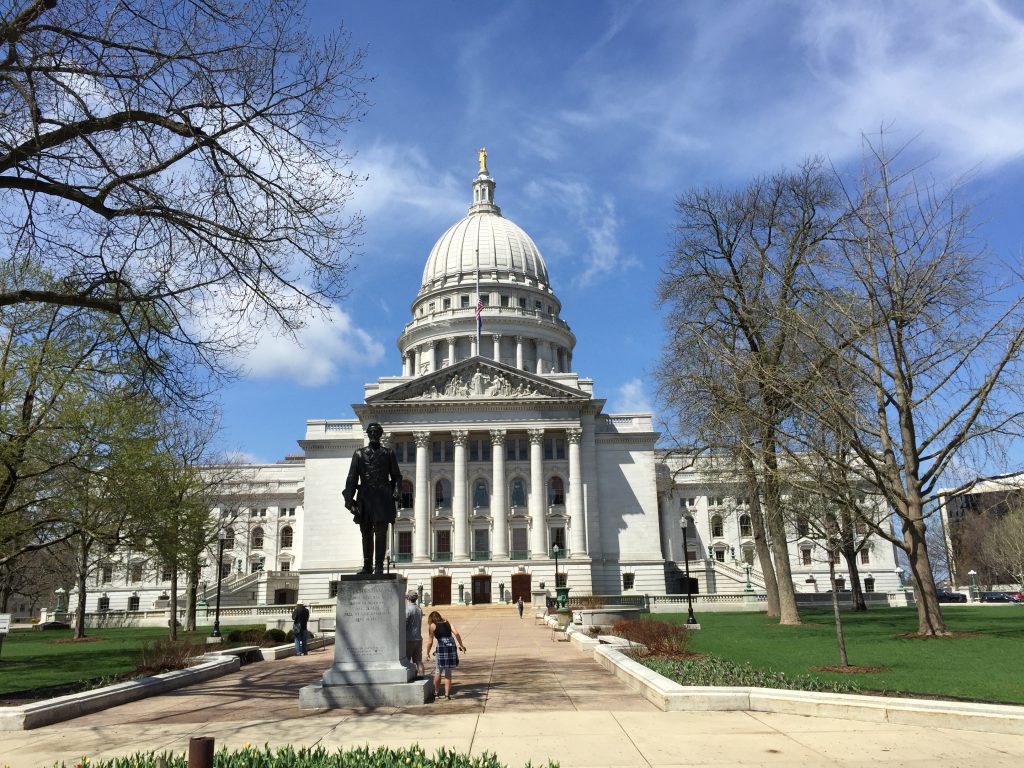550 Lobbyists Busy in State Capitol
Ultimately some 750 lobbyists costing $40 million may battle for state budget decisions.
Lobbying in the state Capitol is big business.
Lobbyists spent $39.13 million trying to influence spending and policy in the 2023 budget year – 10% more than two years earlier. And they are likely to spend even more trying to shape spending in the next state budget, which must be approved by legislators and Democratic Gov. Tony Evers in about six months.
The start of a new legislative session requires lobbyists to register with the State Ethics Commission, declaring the causes, issues and organizations for which they are advocating. They also have to report hours spent lobbying and estimate the costs of those efforts.
Last legislative session more than 750 lobbyists registered, a number that’s increased by about 9% over the last decade.
As of last week, almost 550 lobbyists had registered for the 2025-26 session, which convened Jan. 6. That suggests that there will again be more than five lobbyists for each of the 132 legislators.
Lobbyists who had registered by last week included 17 ex-legislators and dozens of ex-legislative aides, former cabinet secretaries and past power brokers in administrations of the last five governors.
Former legislative leaders who are now lobbyists include Republican Assembly speakers Jeff Fitzgerald and John Gard; Republican Assembly majority leaders Jim Steineke, Scott Suder and Steven Foti; John Nygren, former Assembly Republican cochair of the Joint Finance Committee; former Senate Democratic Leader Jennifer Shilling and former Senate Democratic Majority Leader Joe Strohl.
Some of those ex-legislators and other lobbyists reported having as many as 25 clients; others reported having one client or were registering to work only for their employer.
Not everyone can successfully lobby legislators. Depending on what you’re asking for, or trying to repeal, it can be time consuming, frustrating and maddeningly hit-or-miss. The Capitol, after all, revolves around three Ps: policy, personalities and politics.
But the most successful lobbyists get paid very, very well if – and it’s a big if – they have relationships with legislators and their aides that let them know when to beg, bluff, advise, threaten or genuflect. In any given year, lobbyists may have to do all of those, depending on what they are asking for and who they are asking.
Lobbyists also have to know Capitol rituals and protocols and be able to read the room. Many organization leaders and corporate CEOs hire lobbyists because they don’t have time for, and don’t want to learn Capitol tribal rites.
There’s also a self-perpetuating cycle to lobbying: They tell their clients what they are fighting for and, if they don’t get it, they should be hired next session to try again. And, if they get something their client wants passed, or even part of it, they argue that they must be hired for the following session to fight its repeal, or fight for everything that didn’t pass last session.
But let’s go back to those three Ps.
Lobbying costs soar when groups want major policy changes.
The Milwaukee Brewers, for example, spent $1 million lobbying in 2023 for an updated, winterized stadium in exchange for a promise to stay in the city, according to Ethics Commission reports. Wisconsin Manufacturers & Commerce spent $1.3 million lobbying that year, pushing for changes in tax and regulatory laws. The Wisconsin Hospitals Association spent $1.2 million, also in 2023, pushing for higher health-care reimbursements.
Shifts in Capitol politics can also dictate who gets hired to lobby.
When Republicans took control of the executive and legislative branches in the 2010 elections, demand rose for lobbyists who knew GOP legislators or who had worked with or for them. Conversely, when Democrats took over the Capitol in past elections, some Republican-friendly lobbyists no longer had jobs.
Lobbyists must also deal with legislators and aides whose personalities can be coldly transactional or emotionally insecure. How, for example, do you lobby for a specific bill or spending when two legislators critical to that issue – one Assembly member and one senator – don’t like or trust each other?
And veteran lobbyists sometimes make decisions that prompt a lawmaker to angrily ban them from their office. The lobbyist can then instead recruit a constituent, or several constituents, from that legislator’s district to advocate for the change.
One story illustrates the tricky machinations of lobbying. The leader of a statewide trade organization pushing a major policy change was asked why he hired a prominent lobbyist. “I didn’t want him hired by the opposition,” he explained. “I didn’t want him working against me.”
With decisions like that the total spent on lobbying may exceed $40 million for the coming budget battle.
Steven Walters started covering the Capitol in 1988. Contact him at stevenscotwalters@gmail.com
If you think stories like this are important, become a member of Urban Milwaukee and help support real, independent journalism. Plus you get some cool added benefits.
The State of Politics
-
A Wisconsin Political Trivia Quiz
 Dec 15th, 2025 by Steven Walters
Dec 15th, 2025 by Steven Walters
-
The Fight Over Wisconsin’s House Districts
 Dec 8th, 2025 by Steven Walters
Dec 8th, 2025 by Steven Walters
-
The Battle Over On-Line Betting
 Nov 24th, 2025 by Steven Walters
Nov 24th, 2025 by Steven Walters






















